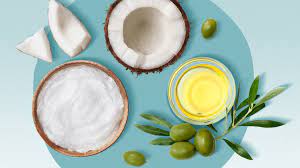Olive oil and coconut oil are two of the most popular and widely used cooking oils in the world. Not only are they versatile in the kitchen, but they also offer a plethora of health benefits and are hailed for their various applications beyond culinary use. In this comprehensive article, we delve into the unique properties, health advantages, and practical uses of both olive oil and coconut oil.
Table of Contents
1. Origins and Extraction:
Olive oil, derived from the fruit of the olive tree, has been a staple in Mediterranean cuisine for centuries. It is primarily produced in countries such as Spain, Italy, and Greece through the pressing of olives, resulting in different varieties such as extra virgin, virgin, and refined olive oil.
On the other hand, coconut oil is extracted from the kernel or meat of mature coconuts harvested from the coconut palm tree. Originating from tropical regions like Southeast Asia and the Pacific Islands, coconut oil is obtained through methods like cold-pressing or expeller-pressing the coconut meat, yielding virgin or refined coconut oil.
2. Nutritional Composition:

Both olive oil and coconut oil boast distinct nutritional profiles that contribute to their health benefits. Olive oil is predominantly composed of monounsaturated fats, particularly oleic acid, which is associated with reducing the risk of heart disease and inflammation. It also contains antioxidants like vitamin E and phenolic compounds, offering protection against oxidative stress.
Conversely, coconut oil is rich in saturated fats, primarily lauric acid, which is known for its antimicrobial properties. Despite its saturated fat content, coconut oil is unique in that it consists mostly of medium-chain triglycerides (MCTs), which are metabolized differently in the body and may promote weight loss and provide quick energy.
3. Health Benefits:

a. Heart Health: The consumption of olive oil, especially extra virgin olive oil, has been linked to improved heart health due to its ability to lower LDL (bad) cholesterol levels and increase HDL (good) cholesterol levels. Its anti-inflammatory properties also contribute to reducing the risk of cardiovascular diseases.
b. Brain Health: The MCTs found in coconut oil have garnered attention for their potential cognitive benefits. Some studies suggest that MCTs may improve cognitive function and memory in individuals with Alzheimer’s disease and other neurodegenerative conditions.
Exploring the Benefits of Olive Oil and Coconut Oil
c. Skin and Hair Care: Both olive oil and coconut oil are prized for their moisturizing properties and are commonly used in skincare and haircare routines. Olive oil’s antioxidants help combat free radicals and promote skin elasticity, while coconut oil’s antimicrobial properties make it effective in treating various skin conditions and nourishing hair.
d. Weight Management: Despite being calorie-dense oils, olive oil and coconut oil can aid in weight management when consumed in moderation. The monounsaturated fats in olive oil promote satiety, while the MCTs in coconut oil may increase energy expenditure and fat burning.
4. Culinary Uses:

Olive oil and coconut oil are essential ingredients in cooking and baking, adding flavor and richness to dishes. Olive oil’s delicate flavor makes it suitable for salad dressings, sautéing, and drizzling over finished dishes. Extra virgin olive oil is best used in cold applications to preserve its nutritional integrity, while refined olive oil can withstand higher cooking temperatures.
Coconut oil’s distinct tropical flavor makes it a popular choice for cooking, especially in Asian and Caribbean cuisines. It is commonly used in stir-fries, curries, and baked goods, imparting a subtle coconut aroma to the dishes. Coconut oil’s high smoke point also makes it suitable for frying and deep-frying.
5. Practical Uses Beyond Cooking:

Apart from culinary applications, olive oil and coconut oil have a myriad of practical uses:
a. Natural Remedies: Olive oil and coconut oil are utilized in homemade remedies for skincare, haircare, and oral health. They can be used as makeup removers, moisturizers, hair masks, and oil pulling agents for oral hygiene.
b. DIY Beauty Products: Both oils serve as key ingredients in DIY beauty products such as body scrubs, lip balms, and massage oils due to their nourishing and hydrating properties.
c. Wood Treatment: Olive oil and coconut oil can be used to condition and polish wooden furniture and utensils, providing a protective layer and enhancing their appearance.
Conclusion:
In summary, olive oil and coconut oil are versatile oils that offer a wide array of health benefits and practical uses. While olive oil is prized for its heart-healthy monounsaturated fats and antioxidant properties, coconut oil stands out for its antimicrobial MCTs and moisturizing effects. Incorporating both oils into your diet and skincare regimen can contribute to overall well-being and enhance your culinary creations and beauty rituals. Whether you’re sautéing vegetables, nourishing your skin, or whipping up homemade remedies, olive oil and coconut oil are indeed a dynamic duo worth embracing for their myriad benefits.

